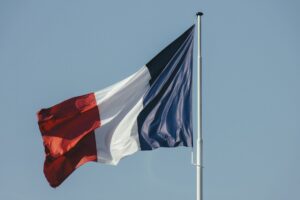Transcript of the video
During your vacations in France or in a French-speaking country, have you ever found yourself a little blocked when you wanted to speak in French, or have you ever felt uncomfortable because you couldn't understand what a waiter in a restaurant or an employee at your hotel reception was saying to you?
Well, it's over.
In this video, I'm going to teach you 20 essential phrases to know if you're traveling to a country where French is spoken. We'll look at useful phrases to know in restaurants, hotels, on public transport to ask for directions and, very importantly, phrases to use in emergency situations.
If you're interested in this type of content, a few weeks ago I put out a guide with the basics you need to know in French to travel.
Don't let the language barrier spoil your vacation in France. In this guide, you'll find ten chapters with everything you need to get by in French.
Each chapter is also accompanied by numerous audios to help you repeat the pronunciation.
And there are eleven videos to help you learn all those useful words and phrases.
In addition to learning useful French words and expressions, you'll also learn many tips for your trip to France, as well as cultural and politeness advice.
To discover this guide, click on the link in the description of this video.
Let's start right away with some useful phrases to know when dining out.
Restaurants are a must when you're on vacation. If you come to France, you're bound to go to a restaurant where French is spoken.
Feel free to pause the video and repeat the phrases after me.
- I don't have a reservation. Do you have a table available?
Often, when we're on vacation, we don't necessarily make reservations, and sometimes we get hungry and see a restaurant that looks nice.
But we don't always know if there's room available, if it's possible to eat there.
So you can ask when you enter this restaurant: "I don't have a reservation. Do you have a table available?"
You can even add: "Do you have a table for two available?" Or "Do you have a table for three? A table for four? Etc.
- Once you've looked at the menu, the waiter may ask, "Are you ready to order?"
He asks if you've made your choice. You can then answer "I'll have" and then say the name of the dish you want. For example, "I'll have the boeuf bourguignon," or "I'll have a glass of red wine."
It works for food and drink. At the end of the meal, the easiest way to ask for payment is to say, "Check, please."
It's very common in France not to pay at the table, but to pay on the way out or at the counter. The waiter may say, "It's at the bar, you can pay at the bar. The waiter then tells you that you have to go and pay.
At the hotel.
When you arrive at your hotel, you usually go to the front desk and say, "Hello, I have a reservation in the name of."
You can even add the number of nights.
- Hello, I have a reservation for four nights in the name of.
- Hello, I have a reservation for four nights in the name of Johnson.
- Another important piece of information to know about your hotel is breakfast time, if breakfast is included.
You can ask at reception: "What time is breakfast?", "What time is breakfast?
The person will certainly give you a time slot. For example, breakfast is served between 8am and 10:30am.
- Another very important piece of information to know is the check-out time.
In French, this term is often used. What time is check-out? What time is check-out?
Does that mean what time do I have to vacate the room?
If you're a foreigner in France, you may not want to use all your data. You can ask for the wifi password.
- What is the Wifi password? What's the Wifi password?
You ask how to access the hotel's wifi.
Sometimes, when you're on vacation, your return flight can be in the evening, and you don't always know what to do with your luggage. So it's essential to know a phrase to ask reception to hold your luggage.
You can say, "Can I leave my luggage at reception until 4 p.m.?"
Of course, you change the time according to your flight. Can I leave my luggage at reception until 4 p.m.?
I know it can be very stressful to have to phone to book a cab. So it's very common for hotels to do it for you. I've already done it on vacation in Lebanon, for example.
I asked the hotel reception if they could book me a cab.
So you can ask the person at reception, "Could you call a cab for me, please?"
If you're coming to Paris or France, you'll certainly be visiting monuments and neighborhoods, and you may need to ask for directions.
Here's a very useful phrase: "Excuse me, where is the nearest metro station?"
- Where's the nearest metro station?
You can ask on the street if you're a bit lost and looking for the metro.
- Where can I buy metro tickets? Where can I buy bus tickets? How to get to.
If, for example, you want to visit a monument like the Eiffel Tower or the Arc de Triomphe and you don't know the route or how to get there, you can go to a ticket office in the metro and ask the person: "How do I get to the Eiffel Tower?
- How to get to the Arc de Triomphe? How to get there? It's a way of asking for directions.
Another important phrase when you're a tourist out for a walk. Once you've asked for directions, you might want to know if you need to take a transport or if you can get there by walking.
You can ask: "Can I walk there? Can I walk there?
It means: Is the distance reasonable? Is it close enough for me to walk there without having to take a transport, a cab or a car?
Let's move on to the last part of the video, and not the funniest.
I'm going to teach you phrases for dealing with emergencies and problems.
An all-purpose phrase you can use in many situations.
It's: I need help, I need help.
You can use it simply to say that you need someone to help you.
It could be to find a doctor because you've lost something, because something's been stolen, because you're lost.
You can use this phrase in any of these situations to call someone out, to politely ask someone for help. My bag's been stolen, my bag's been stolen. I hope it doesn't happen to you. But if it does, it's always better to know this phrase in French, so that people around you can react more quickly.
- My purse has been stolen or my phone has been stolen. My wallet has been stolen.
- I lost my passport. I've lost my passport. I hope this doesn't happen to you. Because it's very annoying to lose your identity documents when you're abroad.
But it's always interesting to know how to say that sentence.
You can also say: "I've lost my bag" or "I've lost my phone" so that someone can help you find it, or point you in the direction of the nearest police station.
- Could you lend me your phone? Can you lend me your phone? If you've lost your phone, had it stolen or simply run out of battery and need to reach someone, you can ask someone: "Could you lend me your phone?"
- If you're ill and want to take some medicine? You can ask someone on the street, for example, or in a subway station: "I'm looking for a pharmacy." I'm looking for a pharmacy. The person will understand that they need to give you directions or show you where the nearest pharmacy is.
That's it for today.
I hope you're planning a vacation in France soon and that you'll love this country.
If you want more content to prepare for your vacation, feel free to click on the link in the description to discover my guide "Essential French words and phrases you need to know to survive in France."
See you soon and have a nice day.







